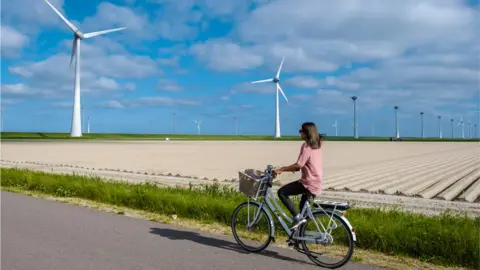Climate change: UK government told to insulate more homes
 Getty Images
Getty ImagesThe UK government must drive down energy bills and reduce climate-warming emissions by insulating more homes, a report says.
Official advisors the Climate Change Committee says the government's current insulation programme is "shocking".
It says consumers are paying £40 extra a year on bills because of previous cuts to the home renovation programme.
The committee also says ministers must harness the Ukraine fuel crisis to push ahead with renewables.
And it says to be fair to poorer families, the portion of electricity bills that pays back historic renewables should be taken off bills and absorbed by the Treasury.
The committee, also known as the CCC, is an independent body advising on climate policy. This report is an annual review of progress to MPs.
It does praise ministers on two issues: it says the government’s renewable energy programme will save people £125 a year on bills by 2030.
And it congratulates ministers on promoting electric cars – even though it says more charge points and more electric vans are needed.
In response to the report, the government noted that over the past three decades the UK had driven down emissions faster than any other G7 country, and that it had clear plans to go further.
"The UK is forging ahead of most other countries with around 40% of our power now coming from cleaner and cheaper renewables," it said.
"This is backed up by £6bn of funding to make our homes and buildings more energy efficient, planting up to 30,000 hectares of new trees a year and more electric cars than ever before on our road - decarbonising our cars and vans faster than any other developed country."
But the CCC warned that unless housing and farming were tackled, the UK won’t achieve its target to achieve net zero emissions by 2050.
'Scant evidence'
The committee agrees that carbon-cutting policies are now in place for most sectors of the economy – but it says there’s "scant evidence" that these goals will be delivered.
And it warns that ministers need a back-up plan, including measures they may prefer to avoid such as asking the public to change behaviour by eating less meat and flying less.
The chairman, Lord Deben, told BBC News that recent climate extremes were “very, very worrying”. He continued: “The public should be proud of the UK setting best targets but I’m very worried that there’s no convincing programme for delivering policies.
“I’m seriously worried that we are not moving fast enough to avert real catastrophe.”
Lord Deben focused on what he called “a lack of sensible policy” on home insulation. He said it was “scandalous” that house-builders were still building new homes that will need retro-fitting.
Overall the committee says credible plans exist for over a third of the emissions reductions needed by the mid-2030s. With luck the UK will manage another quarter; but there’s a high risk that over a third of plans won’t deliver.
It calls for a public engagement strategy on cutting emissions and wants analysis from the Treasury explaining how the costs and benefits of the low-carbon transition will be shared. It also urges changes in tax policy and planning legislation.
This year’s report runs to 600 pages – three times longer than usual. That’s because instead of relying just on reported data, this time the committee has sought evidence on the ground of the low-carbon transition in action.
 Getty Images
Getty ImagesCoal mine plan rejected
In a briefing, the committee again rejected proposals for a new coal mine in Cumbria, but said there would only be a tiny increase in emissions if old coal stations were used to keep the lights on in the winter.
It said the government’s ambitions on nuclear power would be “very tough” to accomplish.
Greenpeace spokesperson Ami McCarthy said: “It’s ironic that the CCC has named this a Progress Report when the government’s progress on climate policy is grinding to a standstill.
“The longer this government drags its feet on greening our homes, delivering renewables and moving our food production system away from meat, the sharper and more costly the shift will be. Time is running out.”
Meanwhile, the engineering firm Atkins considers the CCC over-optimistic. Its separately-published analysis shows the UK needs to build 12-16GW of new generation capacity each year between now and 2035. It warns: “The pace of new-build and complexity of the challenge means a dash to decarbonise power by 2035 may no longer be a credible ambition for the UK.”
The CCC says that unless policies are radically improved, the government will need to try another tack by persuading people to fly less and eat less meat.
The CCC also said the environment department Defra was guilty of “magical thinking” over cutting planet-heating emissions from farms.
Follow Roger on Twitter @rharrabin
